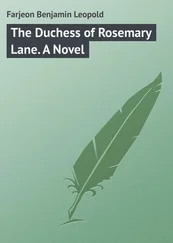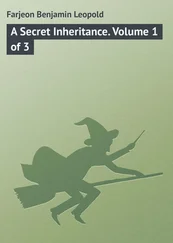Benjamin Farjeon - Miser Farebrother - A Novel (vol. 2 of 3)
Здесь есть возможность читать онлайн «Benjamin Farjeon - Miser Farebrother - A Novel (vol. 2 of 3)» — ознакомительный отрывок электронной книги совершенно бесплатно, а после прочтения отрывка купить полную версию. В некоторых случаях можно слушать аудио, скачать через торрент в формате fb2 и присутствует краткое содержание. Жанр: foreign_prose, на английском языке. Описание произведения, (предисловие) а так же отзывы посетителей доступны на портале библиотеки ЛибКат.
- Название:Miser Farebrother: A Novel (vol. 2 of 3)
- Автор:
- Жанр:
- Год:неизвестен
- ISBN:нет данных
- Рейтинг книги:3 / 5. Голосов: 1
-
Избранное:Добавить в избранное
- Отзывы:
-
Ваша оценка:
- 60
- 1
- 2
- 3
- 4
- 5
Miser Farebrother: A Novel (vol. 2 of 3): краткое содержание, описание и аннотация
Предлагаем к чтению аннотацию, описание, краткое содержание или предисловие (зависит от того, что написал сам автор книги «Miser Farebrother: A Novel (vol. 2 of 3)»). Если вы не нашли необходимую информацию о книге — напишите в комментариях, мы постараемся отыскать её.
Miser Farebrother: A Novel (vol. 2 of 3) — читать онлайн ознакомительный отрывок
Ниже представлен текст книги, разбитый по страницам. Система сохранения места последней прочитанной страницы, позволяет с удобством читать онлайн бесплатно книгу «Miser Farebrother: A Novel (vol. 2 of 3)», без необходимости каждый раз заново искать на чём Вы остановились. Поставьте закладку, и сможете в любой момент перейти на страницу, на которой закончили чтение.
Интервал:
Закладка:
Farjeon B. L. Benjamin Leopold
Miser Farebrother: A Novel (vol. 2 of 3)
CHAPTER I
JEREMIAH PAMFLETT ASSERTS HIMSELF
The innocent fun and gaiety at the tea-table were long afterward remembered. There was an animated discussion as to who should take the head of the table. Phœbe wanted Aunt Leth to do so, but Fanny interfered, and said no one should sit there but Phœbe.
"It is Phœbe's day," persisted the light-hearted girl, "and something unlucky will happen if she doesn't pour out the tea. Mr. Cornwall, come and court me at the bottom of the table."
"Didn't you say it was Miss Farebrother's day?" said Fred, as he took his seat next to the young hostess. He was not wanting in resource, and rather enjoyed Fanny's badinage.
The table was much more plentifully supplied than Phœbe expected, and she cast many grateful glances at Mrs. Pamflett, who had certainly taken pains to do honour to the occasion. Mrs. Pamflett received these tokens of gratitude gravely and quietly; no one would have supposed that her mind was occupied by any other consideration than the comfort of her young mistress's guests. But nothing escaped her secretly watchful eyes; every word, every look, every little attention from Fred Cornwall to Phœbe was carefully noted and treasured up.
A merrier meal was never enjoyed; the buzz of conversation was delightful to hear. Phœbe was the quietest, Fanny the noisiest. Suddenly she became quite still, and gazed pensively at Fred Cornwall.
"A penny for your thoughts," said he.
"They are yours at the price," she replied, holding out her hand for the penny. "I am feeling very sorry for you."
"Why?"
"Because I am convinced you would be much happier if you were at this moment shelling peas with a certain young lady in Switzerland."
This caused a general laugh, and Fred enlarged upon the delights of his trip, Fanny interrupting him a dozen times with some quizzical remark.
"You certainly want some one to keep you in order, Fanny," laughingly observed her mother.
"I do," replied Fanny, dolefully. "Where is that some one? Why does he not appear?"
Toward the end of the meal Mrs. Pamflett swiftly left the room. Looking out of the window she saw her son Jeremiah, and she hastened down to him.
"Well, mother?" said he.
"What has made you so late?" she asked, anxiously.
"Now, don't nag!" he exclaimed. "I couldn't get here before; had a hundred things to look after. The new clothes I ordered never came home, and I had to go and bullyrag the tailor. How do I look, mother?"
"Beautiful, Jeremiah, beautiful!" she said, enthusiastically.
On his feet were patent-leather shoes; on his head the shiniest of belltoppers; on his hands lavender-coloured kid gloves; round his neck a light blue scarf, with a great carbuncle pin stuck in it; and he wore a tourist's suit of russet-brown of a very large check pattern.
"Rather licks 'em, doesn't it?" he asked, in a tone of self-admiration and approval, turning slowly round to exhibit his points.
"That it does, Jeremiah."
"Look at this," he said, taking off his hat.
"Why, you've had your hair curled, Jeremiah!"
"Slightly! Nobby, ain't it?"
"Beautiful! My own dear boy!"
"Keep your fingers to yourself, can't you? There, you've gone and put it all out!" He drew from his pocket a small mirror, and anxiously readjusted the curls his mother had touched. "Now just you be careful. Eyes on, hands off!"
"They must have cost a lot of money, Jeremiah."
"They did; a heap; but in for a penny, in for a pound. There's one comfort; it's all spent on myself. Catch me spending it on anybody else. They cost, altogether – Well, never mind; we're going in for a big thing, ain't we? I ain't particular to a pound or two when the stake's worth it."
"You have the heart of a lion!" said Mrs. Pamflett.
"What will she think of me, mother? Look at me well; reckon me up."
"She can't help thinking as I do, Jeremiah."
"She's a ninny if she don't. She won't get another chance like it, I'll bet."
"What is that you're carrying, my boy?"
"A bouquet. Here, I'll just lift the paper, so that you can see it. Roses, stephanotis, and maidenhair. Now, who'll say I ain't a plucky one? Just wipe this dust off my boots."
In her full-hearted admiration Mrs. Pamflett had lost sight of her conversation with Miser Farebrother, and of the presence of Fred Cornwall in the room above; but now, as she carefully wiped Jeremiah's boots, it all came back to her. Bidding him to give her his best attention, she told him everything; he listened to her attentively, and put a good many questions to her when she had done, the most important of which related to his master.
"He didn't shy at it, then?" he asked.
"No," she replied; "he seemed to take to it kindly."
"You're sure he understood you?"
"He couldn't be off understanding me; I put it to him pretty plain. All you've got to do is to play your cards well."
"I'll do that. When I've got a winning hand I know what to do with it."
"Are you pleased with me, Jeremiah?"
"Yes; it was a bold stroke; only don't do it again. Let me play my own game. I don't mind telling you something if you'll keep it dark." He paused a moment before continuing. "Do you see my thumb?" He held out his right hand, palm upward, with the thumb arched over it. "I've got the London business like this; I've got Miser Farebrother like this. He's under my thumb, mother, and he doesn't know it. If I left him he'd lose thousands, and if the worst comes to the worst I can put it to him like that in a way he can't mistake."
"Don't be rash, Jeremiah," implored Mrs. Pamflett; "be humble with him."
"Oh, yes; I'll be humble with him as long as it suits me. Do you think I've been working all these years for nothing? Do you think I've had the office all to myself for nothing? Does he think I didn't take his measure years and years ago, and that I didn't make up my mind what to do?"
"Jeremiah! Jeremiah!" cried Mrs. Pamflett, "be careful. He's cunning, he's clever; he can see with his eyes shut."
"I can beat him at his own game. Cunning as he is, I'm cunninger; clever as he is, I'm cleverer; I could see without any eyes at all. Wasn't it as clear to me as daylight, if I'd been content to be his slave, taking his miserable few shillings a week, and trying to live on it, that I should be no better off at seventy years than I was at seventeen? Oh, no; not at all! I was a fool, I was, and didn't know how many beans made five! I was born yesterday, I was! There now; I've said enough. You'll live to see something that'll make you open your eyes. Oh! hanged if I wasn't forgetting. What did the governor do with that beggar, Tom Barley?"
"Discharged him. He's gone for good."
"He's gone for bad, you mean. He'll come to a nice end, and I'll help him to it if I can. So the old hunks discharged Tom Barley, did he? Well, I settled his hash for him, at all events."
"It shows what influence you have over the master," observed Mrs. Pamflett.
"I'll have more before I've done with him. Hallo! Just hear how they're laughing upstairs. I say, mother, couldn't you call Phœbe down here? I don't care about giving her the flowers with all that lot looking on and sniggering. Just you go and whisper to her that a gentleman wants very particularly to see her. Wait a minute; is my scarf right?"
"Yes, Jeremiah," said Mrs. Pamflett, and was about to leave him, when he cried again, nervously:
"Wait a minute, can't you? What a hurry you're in. What would you say to her, mother, when you give 'em to her?"
"Wish her many happy returns of the day, Jeremiah; and you might ask if she will give you a cup of tea. That will give you an excuse for following her; she can't very well leave the people upstairs long to themselves."
Читать дальшеИнтервал:
Закладка:
Похожие книги на «Miser Farebrother: A Novel (vol. 2 of 3)»
Представляем Вашему вниманию похожие книги на «Miser Farebrother: A Novel (vol. 2 of 3)» списком для выбора. Мы отобрали схожую по названию и смыслу литературу в надежде предоставить читателям больше вариантов отыскать новые, интересные, ещё непрочитанные произведения.
Обсуждение, отзывы о книге «Miser Farebrother: A Novel (vol. 2 of 3)» и просто собственные мнения читателей. Оставьте ваши комментарии, напишите, что Вы думаете о произведении, его смысле или главных героях. Укажите что конкретно понравилось, а что нет, и почему Вы так считаете.












